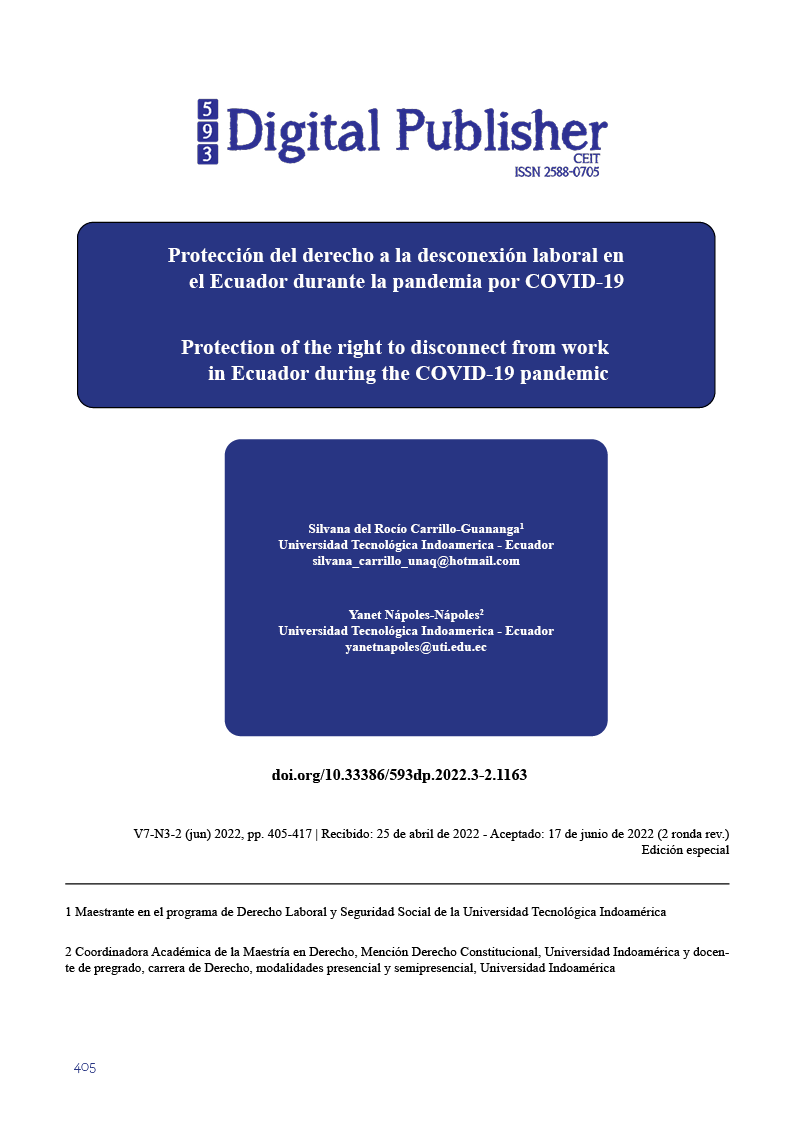Protection of the right to disconnect from work in Ecuador during the COVID-19 pandemic
Main Article Content
Abstract
This article entitled "Protection of the right to disconnection from work in Ecuador during the COVID-19 Pandemic", sought to analyze how the Ecuadorian legal system guarantees the teleworking public servant compliance with the right to disconnection. At first glance, it can be inferred that due to the excessive use of new information and communication technologies (ICT) during the period of the COVID-19 pandemic, employers have had a lot of interference in the private lives of their workers. This has led to alterations in family and social relationships, since in most cases teleworkers do not have the recovery and rest times to which they are entitled. Therefore, the development of this research is of great importance in which a current and relevant topic in the labor legal field is analyzed. The main points of analysis were: 1- Origin and evolution of the work; 2- Concept of teleworking; 3-Elements of teleworking; 4- Teleworking in Ecuadorian legislation; 5- The maximum working day; 6- Right to disconnect and 7. Right to disconnect from work around the COVID-19 pandemic in Ecuador. The methodology used was qualitative, which allowed, through the bibliographic review and observation, to capture the essential qualities and characteristics of the phenomenon for a better understanding of the subject.
Downloads
Article Details

This work is licensed under a Creative Commons Attribution-NonCommercial-ShareAlike 4.0 International License.
1. Derechos de autor
Las obras que se publican en 593 Digital Publisher CEIT están sujetas a los siguientes términos:
1.1. 593 Digital Publisher CEIT, conserva los derechos patrimoniales (copyright) de las obras publicadas, favorece y permite la reutilización de las mismas bajo la licencia Licencia Creative Commons 4.0 de Reconocimiento-NoComercial-CompartirIgual 4.0, por lo cual se pueden copiar, usar, difundir, transmitir y exponer públicamente, siempre que:
1.1.a. Se cite la autoría y fuente original de su publicación (revista, editorial, URL).
1.1.b. No se usen para fines comerciales u onerosos.
1.1.c. Se mencione la existencia y especificaciones de esta licencia de uso.
References
Alles, M. A. (2020). Gestionar sin estar. Ediciones Granica.
Arrieta, F. J. (2019). La desconexión digital y el registro de la jornada diaria en España como mecanismos para garantizar el descanso, la salud y el bienestar de los trabajadores digitales a distancia. Lan Harremanak - Revista de Relaciones Laborales, 42, 89-126. https://doi.org/10.1387/lan-harremanak.21286
Acuerdo Ministerial. [MDT.] (2020, 12 de marzo). Acuerdo Ministerial Nro. MDT-2020-076. https://www.trabajo.gob.ec/wp-content/uploads/2020/03/ACUERDO-MDT-2020-076-TELETRABAJO.pdf?x42051
Acuerdo Ministerial [MDT.] (2020, 15 de marzo). Acuerdo Ministerial Nro. MDT-2020-077. https://www.trabajo.gob.ec/wp-content/uploads/downloads/2020/03/Acuerdo-MDT-202-077.pdf?x42051
Acuerdo Ministerial. [MDT.] (2020, 14 de septiembre). Acuerdo Ministerial Nro. MDT-2020-181. https://www.trabajo.gob.ec/wp-content/uploads/2020/09/AM-MDT-2020-181-TELETRABAJO-14.09.2020-signed.pdf?x42051
Acuerdo Ministerial [MDT.] (2022, 10 de marzo). Acuerdo Ministerial Nro. MDT-2022-035.https://www.trabajo.gob.ec/wp-content/uploads/2022/03/Acuerdo-Ministerial-Nro.-035-Norma-tecnica-para-regular-el-teletrabajo-en-el-sector-publico.pdf?x42051
Baz, J. (2021). Los nuevos derechos digitales laborales de las personas trabajadoras en España: Vigilancia tecnificada, teletrabajo, inteligencia artificial, Big Data.
Bottos, A. V. (2008). Teletrabajo: Su protección en el derecho laboral. http://site.ebrary.com/id/10398532
Buira, J. (2014). El teletrabajo: entre el mito y la realidad https://lectura.unebook.es/viewer/9788490296332
Código de Trabajo [CT.] (2005), Reforma (2020, 22 de junio). https://loyal.finder.lexis.com.ec/WebTools/LexisFinder/DocumentVisualizer/FullDocumentVisualizerHTML.aspx?id=LABORAL-CODIGO_DEL_TRABAJO
Constitución de la República de Ecuador [Const.] (2008, 20 de octubre). https://loyal.finder.lexis.com.ec/WebTools/LexisFinder/DocumentVisualizer/FullDocumentVisualizerHTML.aspx?id=PUBLICO CONSTITUCION_DE_LA_REPUBLICA_DEL_ECUADOR
Ferreyra, C., & Ocampo, C. V. (2020). El derecho a la desconexión digital. El teletrabajo: Una necesidad. Revista de Estudio de Derecho Laboral y Derecho Procesal Laboral │Universidad Blas Pascal, 2. https://doi.org/10.37767/2683-8761(2020)010
Ley Orgánica de Apoyo Humanitario [LOAH.] (2020, 22 de junio). https://loyal.finder.lexis.com.ec/WebTools/LexisFinder/DocumentVisualizer/FullDocumentVisualizerHTML.aspx?id=LABORAL-LEY_ORGANICA_DE_APOYO_HUMANITARIO
Ley Orgánica 3/2018, Protección de datos personales y garantía de los derechos digitales, (2018, 05 de diciembre). https://www.boe.es/eli/es/lo/2018/12/05/3
Llamosas, A. (2015). Relaciones laborales y nuevas tecnologías de la información y de la comunicación. Dykinson. http://vlex.com/source/relaciones-laborales-y-nuevas-tecnologias-de-la-informacion-y-de-la-comunicacion-una-relacion-fructifera-no-exenta-de-dificultades-14343
Martín, P. (2018). Teletrabajo y comercio electrónico. http://www.digitaliapublishing.com/a/60357/
Organización Internacional del Trabajo (2020) El teletrabajo durante la pandemia de COVID-19 y después de ella. https://www.ilo.org/wcmsp5/groups/public/---ed_protect/---protrav/---travail/documents/publication/wcms_758007.pdf
Pérez, F. (2019). Derecho de los trabajadores a la desconexión digital: Mail on holiday. REVISTA IUS, 14(45). https://doi.org/10.35487/rius.v14i45.2020.636
Sagardoy, I. (2021). Puntos críticos en relación al teletrabajo (tras el RDL 28/2020, de 22 de septiembre). Dykinson.
Sierra, E. M. (2011). El Contenido de la relación laboral en el teletrabajo. Junta de Andalucía. Consejo Económico y Social de Andalucía.



